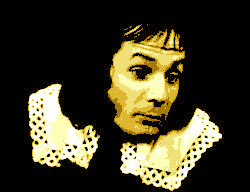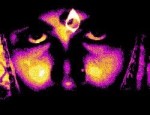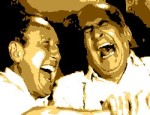Film Review

Although Rossellini once famously described Pascal as "a very boring man who never made love in his life", he clearly had a profound interest and admiration for the intellectual powerhouse who, in his short but productive life, brought about some astonishing advances in thinking in mathematics, physics and theology. Pascal wasn't only a great inventor (the mechanical calculator, syringe, hydraulic press and public transport all owe their origins to him), he was one of the most brilliant mathematicians of his age and a supremely adept experimental physicist to boot. He caused ructions on both the scientific and religious fronts through his rejection of Aristotelian principles and daring (if not to say heretical) musings on theology (his ideas on religion would later be taken up by the existentialists of the 20th century). Blaise Pascal was a free-thinking maverick in an age of dogmatic certainties - and there's nothing a self-respecting filmmaker likes more. Who cares about his non-existent love life? This is the man who pretty well invented the computer at the age of 19, laid the foundations for probability theory by his mid-20s, proved the existence of the vacuum and atmospheric pressure, made some dazzling strides in theological discourse and wrote possibly the greatest work of French prose, Les Pensées. And he did all this before dying of something unspeakably hideous at the age of 39. Far from being dull, Blaise Pascal just didn't have time for all that romantic malarkey.
With several notable television productions already under his belt - including his impressive La Prise de pouvoir par Louis XIV (1966) - Roberto Rossellini had little difficulty garnering an ample budget for this lavish Franco-Italian biopic, although the production schedule was incredibly tight, with just 17 days allotted to filming. The eminent historian Jean Dominique de la Rochefoucauld worked closely with Rossellini to ensure historical accuracy - he supplied most of the dialogue, written as the film was being shot, around scenes that the director had conceived. Important episodes in Pascal's life are privileged in some memorable set-pieces (such as his famous demonstration of the existence of the vacuum and dramatic religious 're-awakening'), but there are other scenes showing the mundanity and precarious nature of life in 17th century France.
Superstition and quackery abound as the old orthodoxies still prevail, a mooring against burgeoning political and economic uncertainty. (This was a time when France was virtually bankrupt and the continent of Europe locked in a seemingly interminable series of religious wars). A witch trial chills the blood, not because of its demonic associations but because those prosecuting the trial are so certain in their beliefs, beliefs that any sane person today would judge to be totally irrational. A broken leg is treated with spittle and foliage - neither the patient nor his healers doubts the efficacy of this treatment. The world that Rosselini presents is distant and unfamiliar yet what it shows is how worryingly resistant the human psyche is to new ideas and how easy it is for the "wrong" ideas to become accepted as divine, unassailable truths. All this makes Pascal's insights appear all the more remarkable in this coldly austere pre-Enlightenment era. The most extraordinary thing about Pascal was not his unrivalled intellectual power (Rosselini rightly portrays him as a beacon of light in an age of almost primeval darkness) but the eagerness with which he challenges the status quo.
In common with Rosselini's other television films, Blaise Pascal has a startling intensity and authenticity, which derive from a remarkable attention to detail in the set design, some meticulous shot composition and the understated performances from a carefully chosen ensemble of acting talent. It was la Rochefoucauld who recommended the then virtually unknown French actor Pierre Arditi for the lead part of Pascal, although Rossellini later claimed that the choice was entirely his own, motivated by the actor's supposed resemblance to the great man. Today, Arditi is one of the much-revered darlings of French cinema, thanks mainly to his long association with the director Alain Resnais. His humane and modest portrayal of Pascal is one of his career achievements, subtly revealing the burning intellect and lust for truth that lies behind the seemingly ordinary outward appearance. The rest of the cast includes some notable Italian and French performers, including Christian de Sica, son of the distinguished Italian filmmaker and actor Vittorio de Sica.
Originally broadcast in two parts on Italian television in May 1972, Blaise Pascal attracted a healthy audience of sixteen million and stimulated a massive interest in the 17th century philosopher. Critical reaction was lukewarm but the film was much better received when it was subsequently aired in France. Rossellini followed this with two similar biographical films, Agostino d'Ippona (1972) and Cartesius (1974), which recount the eventful lives of two other great thinkers to whom much is owed - Saint Augustine and René Descartes respectively.
© James Travers 2016
The above content is owned by frenchfilms.org and must not be copied.
Film Synopsis
Blaise Pascal is 16 years old when his family moves to Rouen in 1639 so that his father Étienne can take up his new position as the king's commissioner of taxes. A mathematical prodigy, Blaise creates a mechanical calculator to help his father in his work and begins corresponding with the great thinkers of the time. His revolutionary ideas, born of a rejection of the old Aristotelian certainties, soon bring him into conflict with religious and scientific orthodoxy, but his insights and striving for truth lead him to formulate some profound observations in physics, mathematics and religion. Intellectually bountiful though it was, Pascal's life was not without pain. As he struggled to reconcile his belief in God with the rationality of his scientific enquiry he was beset with a series of personal crises, the most serious being the severe physical ailments that would cruelly shorten his life...© James Travers
The above content is owned by frenchfilms.org and must not be copied.
Similar Films
Here are some other films you may enjoy watching:Other related links:
Film Credits
- Director: Roberto Rossellini
- Script: Marcella Mariani, Renzo Rossellini, Roberto Rossellini, Luciano Scaffa, Jean-Dominique de la Rochefoucauld
- Photo: Mario Fioretti
- Music: Mario Nascimbene
- Cast: Pierre Arditi (Blaise Pascal), Rita Forzano (Jacqueline Pascal), Giuseppe Addobbati (Étienne Pascal), Christian De Sica (Luogotenente criminale), Livio Galassi (Jacques il servo), Bruno Cattaneo (Adrien Dechamps), Giuseppe Mannajuolo (Florin Perrier), Marco Bonetti (Artus Goufier, duca di Roannes), Teresa Ricci (Gilberte Pascal), Christian Aligny (Jean Dechamps), Bernard Rigal (Cancelliere Séguier), Melù Valente (Charlotte Roannes), Lucio Rama (Moulinet), Mario Bardelli (Matematico Pierre Petit), Claude Baks (Cartesio), Anne Caprile (Michèle Martin, serva di Moulinet), Edda Soligo (Madre superiora Angelica), Tullio Valli (Abate Marin Mersenne), Jean-Dominique de la Rochefoucauld (Padre Noel)
- Country: Italy / France
- Language: Italian / French
- Support: Color
- Runtime: 135 min
The best of Indian cinema

The very best of French film comedy

The very best of Italian cinema
